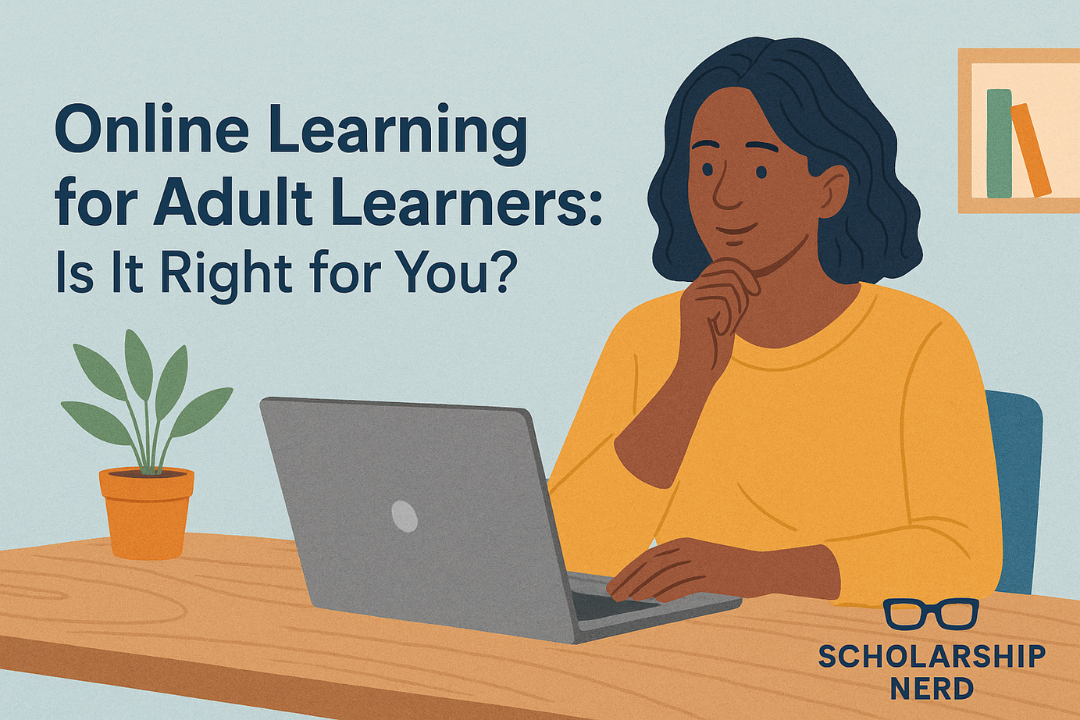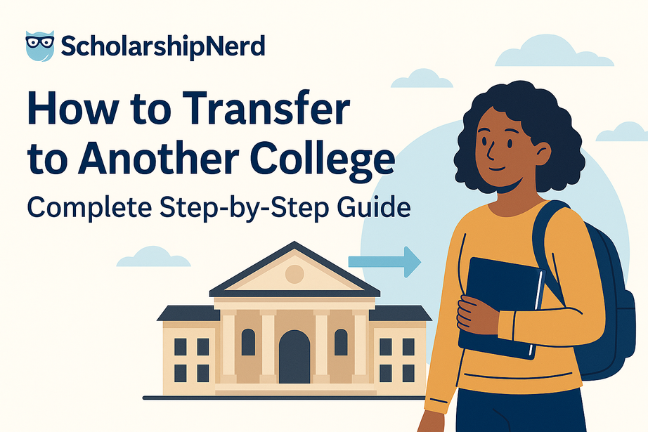If you’re an adult thinking about returning to school, you’re not alone. According to the National Center for Education Statistics (NCES), nearly one in three college students today is over age 25. Many are balancing full-time jobs, raising children, or changing careers, and wondering whether online learning could make earning a degree finally possible.
At Scholarship Nerd, we understand that deciding how to continue your education can feel both exciting and intimidating. This guide walks you through what online learning looks like today, its pros and cons, and how to decide whether it’s the right fit for your goals, lifestyle, and learning preferences.
How Online Learning Works Today
Online education has come a long way since the early "distance learning" programs. Today’s digital classrooms are interactive, accessible, and often surprisingly personal. Schools use Learning Management Systems (LMS) such as Canvas, Blackboard, or Moodle to host lectures, discussion boards, quizzes, and resources in one organized digital space.
Most accredited programs offer three main formats:
- Asynchronous courses let you complete work on your own schedule.
- Synchronous sessions involve live video classes where you can interact in real time.
- Hybrid programs combine online coursework with occasional in-person labs or meetings.
For working adults, this flexibility can make higher education feel attainable again. Reputable schools such as Southern New Hampshire University and University of Phoenix offer accredited degrees recognized by the U.S. Department of Education, which is a crucial factor to verify before enrolling.
Pros of Online Learning for Adults
The rise of online education has opened doors for millions of adults who once thought college was out of reach. While every student’s experience is different, several key benefits stand out, especially for those balancing work, family, and personal responsibilities.
1. Flexibility that fits your life
You can log in after work, on weekends, or during your lunch break. This freedom allows parents, caregivers, and full-time employees to earn a degree without quitting their jobs or relocating.
2. Potential cost savings
Online students often save on commuting, housing, parking, and meal plans. Many programs also offer digital textbooks and reduced fees, making education more affordable overall.
3. Broader access to programs
No longer limited by geography, adult learners can choose from hundreds of programs nationwide. Whether you want to earn a degree in business analytics or early childhood education, chances are you’ll find a reputable option online.
4. Skill building beyond academics
Online courses demand independence, time management, and tech literacy, all skills that employers value highly in today’s workforce.
Cons of Online Learning for Adults
Online education isn’t perfect. Knowing the challenges in advance can help you plan solutions and set realistic expectations.
1. Limited face-to-face interaction
Some students miss the spontaneous connections that come from in-person classrooms. Discussion boards and group projects can help, but it takes extra effort to feel connected virtually.
2. Self-motivation is a must
Without physical classes or professors reminding you of deadlines, it’s easy to fall behind. Success in online learning often depends on setting a routine and sticking to it.
3. Technology and access hurdles
You’ll need a reliable internet connection, a quiet workspace, and basic computer skills. For some adult learners, especially in rural areas, this can be a real barrier.
4. Perception among employers
While most employers now respect accredited online degrees, a few traditional industries still prefer in-person credentials. Always research how your field views online education before enrolling.
If you recognize yourself in some of these challenges, that’s okay. Awareness is power. Many adult students overcome them with careful planning and support.
Online vs. Traditional Learning: Side-by-Side Comparison
Choosing between online and in-person learning doesn’t have to be confusing. The chart below highlights how the two approaches compare across the factors adult learners care about most, from cost to flexibility.
If you value independence, flexibility, and convenience, online learning could be a perfect match. If you thrive on structure, accountability, and face-to-face connection, in-person programs may feel more rewarding. Either path can lead to success if it aligns with your strengths.
Tips for Adult Learners Considering Online Programs
If you’re leaning toward online learning, preparation can make all the difference. Think of these tips as a roadmap to start strong and stay motivated:
1. Verify accreditation.
Before enrolling, check the U.S. Department of Education’s accreditation database to ensure your school is properly recognized. This guarantees your degree is legitimate and eligible for federal financial aid.
2. Explore student support options.
Look for virtual tutoring, 24/7 tech help, and career services, especially if you’ll be studying after work hours.
3. Start small.
Not sure if online learning suits you? Try a certificate or short-term course before committing to a full degree. It’s a low-pressure way to test your comfort level.
4. Build a routine that respects your time.
Create a study schedule that works around your life. Use digital planners or time-blocking tools to protect your study hours.
5. Connect with peers.
Join online study groups or alumni forums. A sense of community helps keep motivation strong when you’re studying alone.
Frequently Asked Questions (FAQ)
1. Is online learning a good choice for adult students?
Yes. For many adults, online education provides the flexibility to pursue a degree without disrupting work or family life. However, success depends on your motivation, discipline, and ability to manage time effectively.
2. Are online degrees respected by employers?
Most employers recognize and value accredited online degrees, especially from reputable institutions. Always confirm that your program is accredited by an agency recognized by the U.S. Department of Education.
3. How can working adults stay motivated in online classes?
Set a clear schedule, treat your coursework like a job commitment, and communicate your goals with family or coworkers. Many adult learners find accountability partners or online study groups helpful.
4. What support is available for online students?
Accredited programs typically offer virtual tutoring, tech support, academic advising, and even online mental health counseling. Don’t hesitate to use these resources; they exist to help you succeed.
5. Can online education save money?
Yes. Online programs often reduce costs related to commuting, housing, and campus fees. Some also offer digital course materials or pay-per-credit options, making them budget-friendly for part-time learners.
Final Thoughts: Choosing What Works Best for You
There’s no universal right or wrong choice. For some adult learners, online programs offer the freedom to finally pursue a dream while balancing real-life responsibilities. For others, the in-person classroom provides motivation and community that online courses can’t replicate.
The best decision is the one that supports your goals, lifestyle, and confidence. And no matter which path you take, Scholarship Nerd is here to help you find verified scholarships and funding opportunities that make your education more affordable and accessible.




